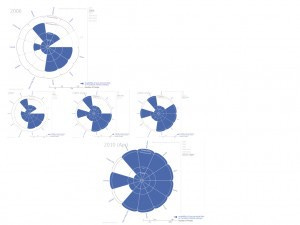Online Privacy Solutions and Creation Vs. Regulation
The New York Times did a great job exposing the complexity of the new Facebook privacy policy. In the same week, they also covered the Diaspora project emerging out of NYU. In the confines of the discussion of privacy on Facebook, user control of data as described by The Times and the reported shift in consumer tolerance for “living in public” is a big deal.
Bottom line, the current online privacy environment is messy, lacks transparency and does not offer some consumers enough control. The black and white issue is not public vs. private at the network level but transparency and control at the individual user level.
Facebook is leading the way in rapidly adjusting their privacy policies in response to new opportunities and as they do this, more opportunities for innovation are created — both leveraging consumer data and helping consumers control its use. Politicians also see opportunity, but the path towards regulation is often littered with abandoned innovative efforts.
Diaspora* is not alone in seeing an opportunity to serve consumers who want more transparency and control around their data. The private sector response to privacy concerns is not just about Facebook, it is much broader. In a recent announcement of the product vision for FireFox 4, Mike Beltzner describes one of the three key features as
“Empowering: putting users in full control of their browser, data, and Web experience.”
For me, this is proof of the efficiency of the private market and I hope Mr. Boucher and the rest of Washington take notice, give a friendly nod to the entrepreneurial community and get out of the way.
Facebook’s privacy policy and default sharing settings have evolved over time and the images below from Matt McKeon do a fantastic job illustrating this…
[caption id=”attachment_530" align=”aligncenter” width=”300" caption=”The “evolution” of Privacy on FaceBook”]
[/caption]
The comparison of the extended Facebook policy to the length to the US constitution is appropriately snarky. However, the draft of the Boucher bill (PDF) is 5448 words across 27 pages and my guess is the legislation will get longer in the process of becoming a law, not shorter. Worth noting, it is already just 400 words short of the new Facebook policy and shares the distinction of being longer than the US constitution by a good margin.
Both the Boucher bill and these private sector efforts are focused on providing consumers with control and transparency around the use of their data. The difference is the start-ups are innovating at a rapid pace and their goals can be described in 11 words and 1 word respectively.
The Boucher bill will not take effect until one year after it is enacted, the Diaspora* project and FireFox 4 will be available to everyone by the fall. The Boucher bill spends all 5,500 words describing what companies can’t do with consumer data. The entrepreneurs efficiently focus on what consumers want to do and will deliver a viable mechanism for transparency and control of data to the market. This is a case of regulation vs. creation and the winner is clear.
+1 for entrepreneurs.




